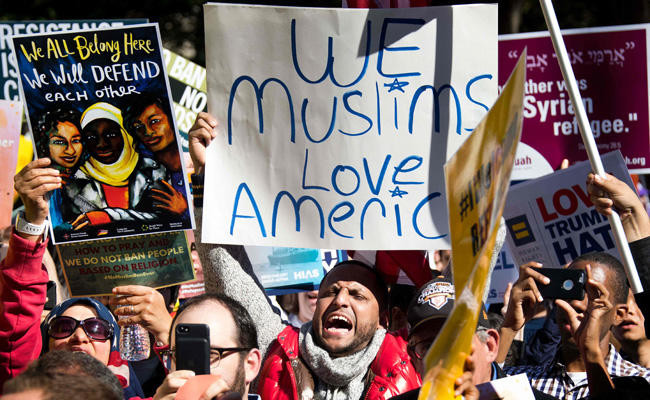WASHINGTON: The Supreme Court on Monday allowed the Trump administration to fully enforce a ban on travel to the United States by residents of six mostly Muslim countries.
This is not a final ruling on the travel ban: Challenges to the policy are winding through the federal courts, and the justices themselves ultimately are expected to rule on its legality.
But the action indicates that the high court might eventually approve the latest version of the ban, announced by President Donald Trump in September. Lower courts have continued to find problems with the policy.
Opponents of this and previous versions of the ban say they show a bias against Muslims. They say that was reinforced most recently by Trump’s retweets of anti-Muslim videos.
“President Trump’s anti-Muslim prejudice is no secret. He has repeatedly confirmed it, including just last week on Twitter. It’s unfortunate that the full ban can move forward for now, but this order does not address the merits of our claims,” said Omar Jadwat, director of the American Civil Liberties Union’s Immigrants’ Rights Project. The ACLU is representing some opponents of the ban.
Just two justices, Ruth Bader Ginsburg and Sonia Sotomayor, noted their disagreement with court orders allowing the latest policy to take full effect.
The new policy is not expected to cause the chaos that ensued at airports when Trump rolled out his first ban without warning in January.
The ban applies to travelers from Chad, Iran, Libya, Somalia, Syria and Yemen. Lower courts had said people from those nations with a claim of a “bona fide” relationship with someone in the United States could not be kept out of the country. Grandparents, cousins and other relatives were among those courts said could not be excluded.
The courts were borrowing language the Supreme Court itself came up with last summer to allow partial enforcement of an earlier version of the ban.
Now, those relationships will no longer provide a blanket exemption from the ban, although visa officials can make exceptions on a case-by-case basis.
The justices offered no explanation for their order, but the administration had said that blocking the full ban was causing “irreparable harm” because the policy is based on legitimate national security and foreign policy concerns.
In lawsuits filed in Hawaii and Maryland, federal courts said the updated travel ban violated federal immigration law. The travel policy also applies to travelers from North Korea and to some Venezuelan government officials and their families, but the lawsuits did not challenge those restrictions. Also unaffected are refugees. A temporary ban on refugees expired in October.
All the rulings so far have been on a preliminary basis. The San Francisco-based 9th US Circuit Court of Appeals and the 4th US Circuit Court of Appeals in Richmond, Virginia, will be holding arguments on the legality of the ban this week.
Both courts are dealing with the issue on an accelerated basis, and the Supreme Court noted it expects those courts to reach decisions “with appropriate dispatch.”
Quick resolution by appellate courts would allow the Supreme Court to hear and decide the issue this term, by the end of June.
US Supreme Court allows full enforcement of Trump travel ban
US Supreme Court allows full enforcement of Trump travel ban

’Albania belongs in EU,’ von der Leyen tells re-elected PM Rama

- EU and French leaders congratulated Albanian Prime Minister Edi Rama Wednesday after his party’s electoral victory
“Let’s keep working closely together on EU reforms. Albania belongs in the EU!” von der Leyen said on X. French President Emmanuel Macron also hailed Rama’s win, writing on X: “France will always stand alongside Albania on its European path.”
Germany arrests three Ukrainians suspected of spying in exploding parcel plot

BERLIN: Germany has arrested three Ukrainian nationals on suspicion of foreign agent activity linked to the shipment of parcels containing explosive devices, prosecutors said on Wednesday.
The suspects are believed to have been in contact with individuals working for Russian state institutions, federal prosecutors said in a statement.
France says to expel Algerian diplomats in tit-for-tat move

PARIS: France will expel Algerian diplomats in response to plans by Algiers to send more French officials home, Foreign Minister Jean-Noel Barrot said Wednesday, as relations between the countries deteriorate.
Barrot told the BFMTV broadcaster that he would summon Algeria’s charge d’affaires to inform him of the decision that he said was “perfectly proportionate at this point” to the Algerian move, which he called “unjustified and unjustifiable.”
Japanese military training plane crashes with two on board

TOKYO: A Japanese military training plane crashed shortly after takeoff, authorities said Wednesday, with reports saying two people were on board the aircraft which appeared to have fallen in a lake.
“We’re aware a T-4 plane that belongs to the Air Self-Defense Force fell down immediately after taking off at Komaki Air Base” in central Japan, top government spokesman Yoshimasa Hayashi said.
“Details are being probed by the defense ministry,” he told reporters.
The T-4 seats two and is a “domestically produced, highly reliable and maintainable training aircraft... used for all basic flight courses,” according to the defense ministry website.
The aircraft was flying around Lake Iruka near Inuyama city north of Nagoya, according to media outlets including public broadcaster NHK.
“There is no sight of the plane yet. We’ve been told that an aerial survey by an Aichi region helicopter found a spot where oil was floating on the surface of the lake,” local fire department official Hajjime Nakamura told AFP.
He said his office had received unconfirmed information that there were two people on board but that they had not been able to independently verify this.
Aerial footage of the lake broadcast by NHK showed an oil sheen on its surface, dotted with what appeared to be various pieces of debris.
Just after 3:00 p.m. (0600 GMT) the local fire department received a call saying it appeared that a plane had crashed into the lake, the reports said.
The reports added, citing defense ministry sources, that the training plane had disappeared from the radar.
The defense ministry was not able to immediately confirm details to AFP.
Jiji Press said the local municipality had said there had been no damage to houses in the area.
Kabul says ready for ‘dialogue’ with US on Afghan refugees

- Over 11,000 Afghans in the US risk deportation after losing temporary protected status this month
- Many of them backed the US during the 20-year war in Afghanistan and fled in fear of the Taliban
KABUL: The Taliban government said Tuesday it was ready for “dialogue” with the Trump administration on the repatriation of Afghan refugees whose legal protections in the United States will be revoked in July.
Citing an improved security situation in Afghanistan, Washington announced Monday that the temporary protected status (TPS) designation for Afghanistan would expire on May 20 and the termination would take effect on July 12.
Kabul is “ready to engage in constructive dialogue with the US & other countries regarding repatriation of Afghans who no longer meet criteria to remain in host countries,” said Abdul Qahar Balkhi, spokesman for the Ministry of Foreign Affairs, on X.
The Taliban government has already offered assurances that those Afghans who fled the country as they stormed back to power in 2021 could safely return.
However, the United Nations has reported cases of executions and disappearances.
Taliban authorities have also squeezed women out of education, jobs and public life since 2021, creating what the UN has called “gender apartheid.”
The move by Washington could affect more than 11,000 Afghans, many of whom supported the United States during two decades of war and fled Taliban persecution, according to Shawn VanDiver, president of AfghanEvac.
“Afghanistan is the shared home of all Afghans, & all have the right to free movement,” Balkhi said in his statement.
The country has faced a major economic crisis since 2021 and is enduring the second worst humanitarian crisis in the world after Sudan, according to the United Nations.
More than 100,000 Afghans have returned home since neighboring Pakistan launched a new mass expulsion campaign in April.
More than 265,000 undocumented Afghans also returned from neighboring Iran between January and April, according to the International Organization for Migration (IOM).
US federal law permits the government to grant TPS to foreign citizens who cannot safely return home because of war, natural disasters or other “extraordinary” conditions.
But since taking office President Donald Trump has moved to strip the designation from citizens of countries including Haiti and Venezuela as part of his broader crackdown on immigration.
















